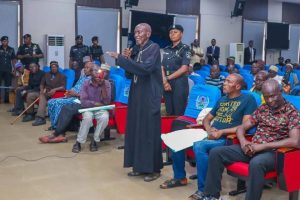Aviation Stakeholders Converge Over Unregulated Aircraft
On the 17th to 18th July 2017, a world symposium on the Remotely Piloted Aircraft Systems (RPAS), was held at the Abuja Sheraton Hotel in Abuja, Nigeria, with the theme “ Remotely Piloted Aviation in Africa: Sharing Experiences And Challenges”.
The event which was hosted by the Government of Nigeria, Federal Ministry of Transportation (Aviation Sector), provided a unique opportunity for States, international organizations and stakeholders to share experiences in addressing RPAS operations across the African continent and Indian Ocean. It also x rayed how to overcome anticipated challenges the RPAS will present and the benefits it has to offer to the African continent and the Indian Ocean,
Stakeholders also identified how existing rules need to evolve to facilitate entrance of the RPAS community into the civil aviation system, examining alignment between ongoing RPAS development and supporting regulatory provisions.
The symposium also showcased the opportunities that will be created by the integration of RPAS into the global civil aviation system, enabling participants to leave with a greater understanding of the complex issues that needed to be addressed collectively to facilitate integration.
Rule-making authorities, air navigation service providers, industry partners, international and humanitarian organizations and other stakeholders had the opportunity to contribute their knowledge and experiences, as they highlighted security challenges that may come up as a result of global legalization of RPAS .
The industry exhibit showcased the breadth of existing technologies and the thriving research and development activities currently underscoring this new sector of the aviation industry.
In his key note address, the Minister of State, Aviation welcomed the participants and noted that RPAS technology has sparked global excitement and is moving with a great speed in the in the aviation industry.
He informed the audience that the Federal Government is establishing a committee to look at the safety of RPAS.
He urged the delegates to deliberate on how the RPAS facility and its enhanced operations will create jobs in Agriculture, filmmaking, researchers, deliveries, etc while noting the accompanying dangers.
He called on the aviation regulatory bodies in Nigeria especially the Nigerian Civil Aviation Authority (NACA), to ensure strict compliance.
In his speech the President of ICAO acknowledged that
Aviation is undergoing a fundamental change in light of the wide spread introduction of unmanned aircraft, which until recently were operated on the periphery of the aerospace system.
He also mentioned that the world including Africa is already seeing new businesses and humanitarian operations leveraging these technologies and the opportunities they offer, in ways that we had not envisioned even just a decade ago.
On the challenge of balancing safety and security with efficiency and sustainability, he said that many States and organizations, are contributing to this process, an ICAO’s mission to ensure global harmonization of the various solutions.
Then there is the challenge of thousands of these aircraft being sold daily at present, their diverse characteristics and features of which many are being sold to individuals who are unfamiliar with how to operate them safely responsibly in an aviation environment.
There has been request by ICAO to expand its scope of work to provide a baseline of provisions to ensure global harmonization for all types of unmanned aircraft and their operations including domestic.
In his words, “if you consider a company like Amazon, for instance, which presently is envisaging a global drone fleet to enhance its deliveries, the value of having a potential myriad of domestic regulations aligned via globally harmonized international standards”
In his words, The President of Council, International Civil Aviation Organisation (ICAO), Dr Olumuyiwa Aliu. Said that the ICAO has to develop a new methodology that would provide the agility necessary to respond to such a rapidly evolving industry. Standards which take three to five years to develop and another two years to adopt cannot meet that demand in the timeframe which is both expected and required in order to assure continued safe and efficient operations.
Finally he noted that the Unmanned Aircraft Systems Advisory Group (UAS-AG) comprised of experts from around the world, has been brought together to review the proposals, assess their validity, and select ones to be presented at Drone Enable, ICAO’s unmanned aircraft systems Industry Symposium, which will be held from 22 to 23 September at our at the headquarters in Montreal.
In attendance the Second Vice-President of the council, Mr Nuhu Musa, and Mrs Iyobo Sosina, Secretary General, African Civil Aviation Commission (AFCAC) as well as Mr. Mam Sait Jallow, ICAO’s Regional Director for West and Central Africa.
Worthy to note that there have been increased hosting of international events by the Federal Ministry of Transportation, which indicates the readiness of the Federal Government of Nigeria to maximize the accruable revenue from all aspects of transportation








